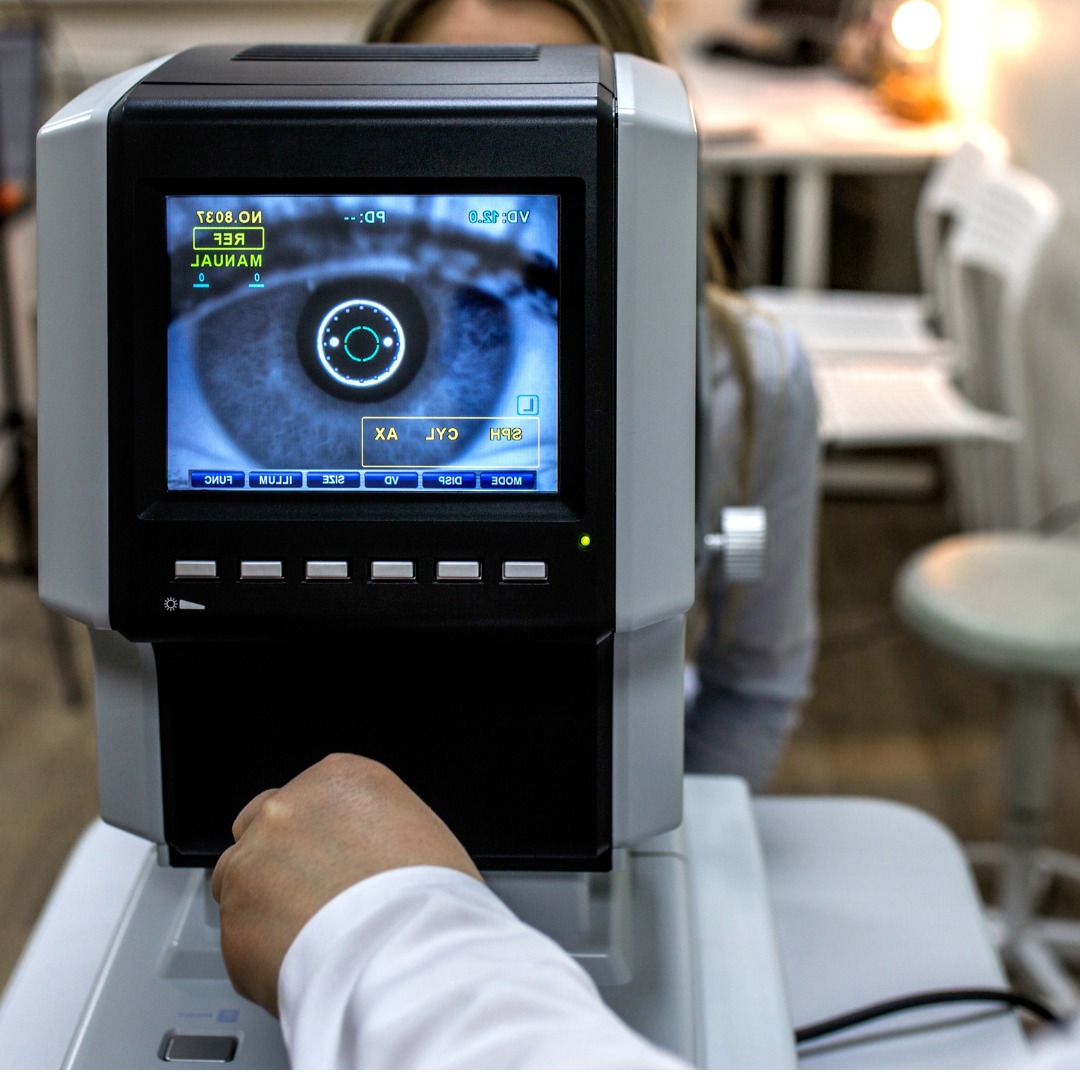Ophthalmology Care: Eye Disease & Disorder Treatment in Baton Rouge & Beyond
Ophthalmology is the study and treatment of disorders and diseases of the eye. This includes performing corrective eye surgeries, implementing laser therapy, as well as using specialized tests and medication to treat the eyes.
Our ophthalmologist, Nick E. Frisard, MD embraces a proactive approach to eye care, seeking to prevent conditions and diseases that can destroy healthy vision. Having a regular eye exam helps prevent countless diseases and provide early detection of others, like diabetes, arthritis, cancer, and more. The eyes often signal a problem in the early stages before it is detectable anywhere else within the body.
As a physician of The Baton Rouge Clinic, Dr. Frisard has the ability to communicate directly with your other healthcare providers, as well as gain immediate access to all of your medical records and testing through The Baton Rouge Clinic. This allows us to deliver the most comprehensive, effective, and efficient healthcare possible.
Our mission is to improve our patient’s quality of life through better vision with compassionate, excellent eye care and personal service. We are dedicated to delivering the highest quality medical and surgical eye care utilizing the most sophisticated, cutting-edge technologies available today.

Ophthalmology Services for Eye Disease and Eye Care at The Baton Rouge Clinic:
- Clear Lens Exchange and Near Vision Correction
- Complete Routine Exams
- Child Eye Exams
- Contact Lens : Including specialty contact lenses such as: keratoconus, toric, post corneal transplant, high astigmatism, multi-focal lenses
- Diabetic Exams
- Glaucoma Testing and Management
- Macular Degeneration Testing and Management
- Dry Eye Treatment
Providers Offering This Service
We are proud to work with many of the most respected physicians in the region who are proven experts in their fields of medicine.
Bladeless Laser Vision Correction including LASIK and PRK
LASIK & PRK
Laser In Situ Keratomileusis (LASIK) was originally developed to treat patients who had very poor vision due to corneal disease. The advancement of medical lasers has now made it possible to correct nearsightedness (myopia), farsightedness (hyperopia), and astigmatism. The entire surgical process takes place in about 20 minutes and can eliminate the need for corrective lenses.
Photorefractive Keratectomy (PRK) is another type of laser vision correction that does not require the creation of a flap. Some patients may be better candidates for a PRK procedure. Your surgeon will discuss these options and help choose the best possible treatment plan for you.
-
Is Laser Vision Correction safe?
LASIK is a safe and effective option for vision correction. Having concerns about the safety of the surgery and your eyesight is normal. You owe it to yourself and your vision to research the procedure thoroughly so you fully understand the risks and benefits. LASIK uses advanced computer-driven laser technology to reshape the cornea with microscopic precision. The high degree of precision and accuracy afforded by this combination of technologies helps ensure patient safety.
More than 19 million LASIK procedures have been performed in the U.S. with very high patient satisfaction in visual outcomes. The high rate of patient satisfaction, more than 96 percent according to the most recent clinical data, is due in part to the extremely low risk of complications from the surgery. Based upon the research into and clinical experience with LASIK, the rate of complications from LASIK eye surgery is estimated to be less than 1 percent, which makes it one of the safest elective surgical procedures available today.
Technology first developed by NASA to help automate the docking of satellites to the Space Shuttle is used by the LASIK platform to track your eye movements – thousands of times per second – allowing the device to adjust as needed to ensure proper application of the treatment. Many patients are concerned about moving during the procedure. The tracking system built into the laser that follows your eye will also temporarily turn off the laser if you move significantly (such as a cough or sneeze). Once you are safely repositioned under the laser, the procedure can resume.
-
What kind of results can I expect?
Laser Vision Correction is extremely successful in reducing dependence on glasses or contacts. The degree of improvement may vary among patients based upon the severity of their prescription and how quickly they heal. More than 98% of patients who have laser vision correction are able to drive, watch TV and function daily without the need for glasses or contacts. In addition, LASIK has an unprecedented 96 percent patient satisfaction rate – the highest of any elective procedure.
-
Does Laser Vision Correction hurt?
Laser Vision Correction is a very non-intrusive procedure. No needles, tubes or IVs! Only anesthetic eye drops are used during the procedure. The procedure only takes about 15 minutes for both eyes, and the healing process begins immediately with little to no discomfort.
-
How long does it take before my vision improves?
Many patients see a remarkable improvement in their vision the day following their procedure. The vast majority of individuals are able to drive their car and go to work the next day. Although the speed of recovery depends upon personal healing patterns, most patients notice dramatic visual improvement within a few days. Patients with higher prescriptions may heal more slowly. You should notice a daily improvement in your vision. Slight fluctuations in vision may occur while healing.
Cataract Surgery
Laser Cataract / Surgery Premium Multi-focal Lens / Implants Astigmatism Correction
Through new technological advances, cataract surgery today is faster, more effective and more comfortable for the patient. Cataract surgery is the most frequently performed surgery in the United States. More than 20 million Americans over the age of 40 have cataracts, and more than two million people have cataract surgery each year in the United States.
Using the latest technology such as laser assisted cataract surgery and multifocal lenses, Dr. Frisard is able to help our patients achieve their goals of being less reliant on glasses for most of their daily activities.
-
What is a Cataract?
A cataract is a clouding of the normally clear lens of the eye. This clouding of the lens causes the light to scatter and prevents some light from reaching the retina which then causes blurred vision. This condition usually occurs slowly over time; however, it can also happen quickly.
-
What are some symptoms of Cataracts?
- Details are difficult to see
- Cloudy, fuzzy or blurry vision
- Double vision
- Changes in the color of the pupil
- Poor night vision
- Sensitivity to light and glare, especially while driving at night
- Frequent changes in your glasses prescription
- Dull colors
- Inability to perform activities such as reading or driving due to poor vision
-
When should you see your doctor?
If you experience any of the above mentioned symptoms, please make an appointment with your doctor as soon as possible. Early diagnosis is the best method of management. Regular office visits assist your doctor in determining if cataracts are affecting your ability to see. However, if your vision suddenly becomes worse, see your doctor promptly.
-
What are your surgery options?
Cataract surgery will only be performed once, and the results will last a lifetime. It is important to carefully consider all of your options to improve your vision. For the patient that desires a life without glasses, it will be necessary to use the latest technology to reduce astigmatism. Reduction in astigmatism can be achieved either with laser assisted cataract surgery or a custom shape matched lens implant. Dr. Frisard will recommend the best technology available to reduce your astigmatism and improve your vision without a need for glasses.
For the patient that desires maximum independence from glasses, including freedom from reading glasses, the use of a Multi-focal lens will be necessary. Multi-focal lenses bend light in multiple lengths, allowing the patient to see clearly for distance, intermediate, and near vision without the need for glasses.
Glaucoma Surgery: including Micro Stents and Drainage Devices
-
What Is Glaucoma?
Glaucoma is a general term used to describe damage to the optic nerve caused by eye pressure. If Glaucoma is not treated, pressure to the eye increases, causing loss of peripheral (side) vision.
-
How Is Glaucoma Detected?
High eye pressure occurs when drainage channels in the eye become clogged causing the pressure in the eye to increase. Usually, high eye pressure does not hurt and is not related to blood pressure. In its early stages, Glaucoma shows no symptoms. In fact, up to 40% of your optic nerve can be damaged before you notice any vision loss.
Regular and complete eye examinations are the best way to detect Glaucoma. The tests are simple and painless. We will use these tests to diagnose glaucoma and determine the best treatment for the disease.
-
How Is Glaucoma Treated?
Damage caused by glaucoma is irreversible; however, medications, laser surgery and/ or traditional surgery are used to prevent further loss of vision when properly supervised by your doctor. Most glaucoma induced blindness is a result of not following your doctor’s advice about timely glaucoma examinations, diagnostic testing and the use of your prescription eye drops to control pressure.
Other Eye Diagnostics and Procedures
- Clear Lens Exchange and Near Vision Correction
- Eyelid Surgery
- Low Vision: Including magnification and driving with telescopes
- Punctal Plug Placement for Dry Eye
- Botox Injections
- External Ocular Photos
- Fundus Photos
- Retinal OCT Scans
- Pressure Testing
- Humphrey Visual Field
- Optic Nerve Analysis
- Corneal Topography

Our Ophthalmology and Optometry Departments were chosen as the Runner-Up of Baton Rouge Parents Magazine’s Family Favorite Eye Center in 2023! We have previously won this award in 2022! The awards are held annually through Baton Rouge Parents Magazine, and all nominations are submitted by readers around the Baton Rouge area. Thank you to all who participated!